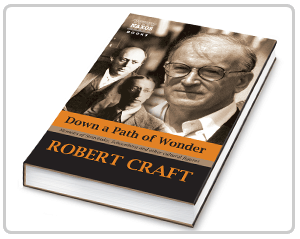Down a Path of Wonder (Book)
- Hardback
- 560 pages
- Author: Robert Craft
- 13-digit ISBN: 978-1-84379-217-8
- 10-digit ISBN: 1-84379-217-6
Robert Craft met Stravinsky by invitation in 1948, after nearly four years of letter correspondence with the composer. It was this close association that steered Craft into a stimulating world of leading composers, writers and artists.
At virtually the same time that he became a member of the Stravinsky household, Craft, aged twenty-four, discovered the ‘path of wonder’ created by Arnold Schoenberg. In 1950 the young conductor sought instruction from Schoenberg in the performance of his music, and maintained a friendship with him that became increasingly cordial until the week of the composer’s death a year later. ‘Remembering Schoenberg’, the first chapter of Down a Path of Wonder, charts with charm the development of this mutual understanding and friendship.
Craft’s musical observations are pertinent and witty, and it is music that underpins this collection of memoirs. However, his descriptions of Stravinsky’s collaborator-friends, such as George Balanchine, T.S. Eliot, W.H. Auden, Aldous Huxley and other Makers of the Twentieth Century, also provide a fascinating contribution to the intellectual and cultural history of our era.
Craft’s travel diaries, forming the final part of this book, focus on Italy, Seville and Cambodia; they are similarly insightful, colourful and edifying.
Down a Path of Wonder is a unique and truly compelling perspective on the post-Second World War artistic world – and beyond.
Reviews
‘The assumption behind any work of art is that it will spark a response. The artist is inviting us not just to consume the product of his or her imagination but to use ours. But how much does our knowledge of the artist influence our response? The less information we are fed about the art and its creator, the less processed our responses will be. If we have no prior information, we can’t read anything extra-artistic into it: it has the opportunity to speak “purely”.’
– Andrew Clark, Financial Times































